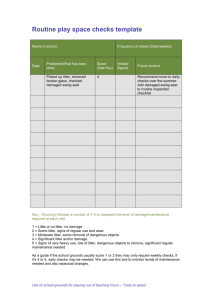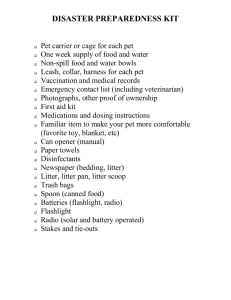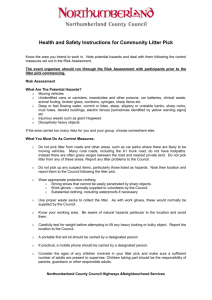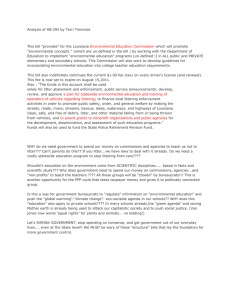Thames Litter Forum October 2014 minutes
advertisement
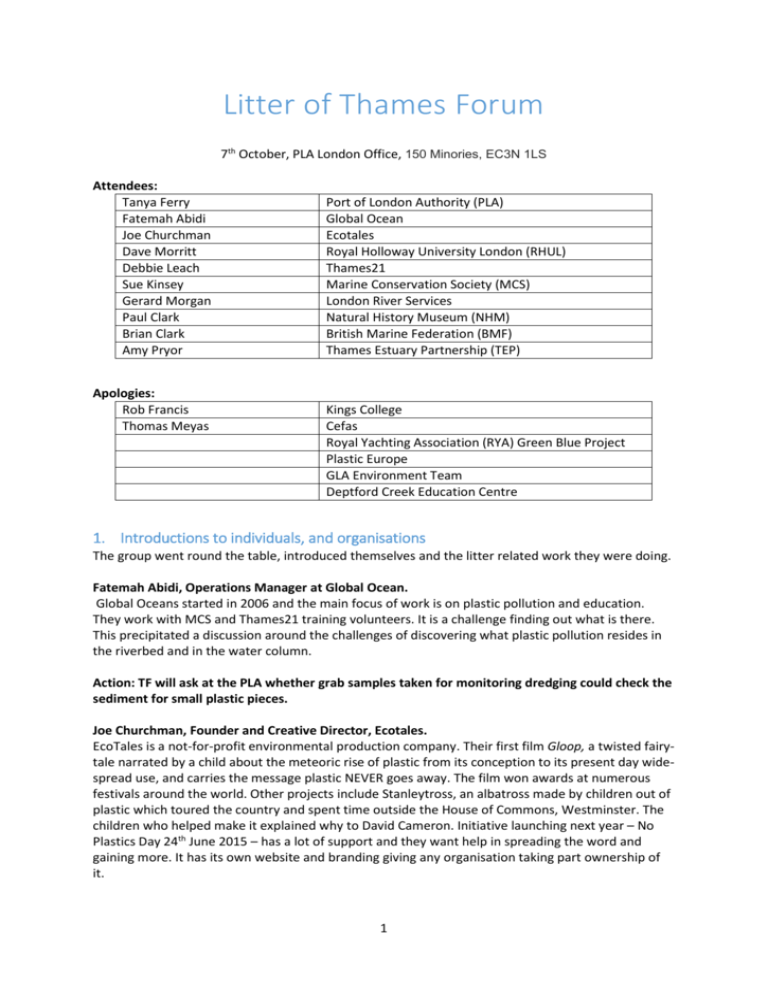
Litter of Thames Forum 7th October, PLA London Office, 150 Minories, EC3N 1LS Attendees: Tanya Ferry Fatemah Abidi Joe Churchman Dave Morritt Debbie Leach Sue Kinsey Gerard Morgan Paul Clark Brian Clark Amy Pryor Apologies: Rob Francis Thomas Meyas Port of London Authority (PLA) Global Ocean Ecotales Royal Holloway University London (RHUL) Thames21 Marine Conservation Society (MCS) London River Services Natural History Museum (NHM) British Marine Federation (BMF) Thames Estuary Partnership (TEP) Kings College Cefas Royal Yachting Association (RYA) Green Blue Project Plastic Europe GLA Environment Team Deptford Creek Education Centre 1. Introductions to individuals, and organisations The group went round the table, introduced themselves and the litter related work they were doing. Fatemah Abidi, Operations Manager at Global Ocean. Global Oceans started in 2006 and the main focus of work is on plastic pollution and education. They work with MCS and Thames21 training volunteers. It is a challenge finding out what is there. This precipitated a discussion around the challenges of discovering what plastic pollution resides in the riverbed and in the water column. Action: TF will ask at the PLA whether grab samples taken for monitoring dredging could check the sediment for small plastic pieces. Joe Churchman, Founder and Creative Director, Ecotales. EcoTales is a not-for-profit environmental production company. Their first film Gloop, a twisted fairytale narrated by a child about the meteoric rise of plastic from its conception to its present day widespread use, and carries the message plastic NEVER goes away. The film won awards at numerous festivals around the world. Other projects include Stanleytross, an albatross made by children out of plastic which toured the country and spent time outside the House of Commons, Westminster. The children who helped make it explained why to David Cameron. Initiative launching next year – No Plastics Day 24th June 2015 – has a lot of support and they want help in spreading the word and gaining more. It has its own website and branding giving any organisation taking part ownership of it. 1 Dr David Morritt, Senior Lecturer, Biological Sciences, RHUL. His work examines how invertebrate groups are adapted to stressful habitats and how they respond to environmental stresses, both natural e.g., salinity, temperature and xenobiotic e.g., pesticides, heavy metal pollutants and plastic pollution. Surveys on mitten crabs have discovered plastic in gut contents. Debbie Leach, Executive Director, Thames21. Thames21 were created to tackle issues of litter on the Thames. They are supported by Keep Britain Tidy and the PLA. They engage communities and train volunteers through foreshore clean ups and surveys and look at sources of litter. Host numerous Catchment Partnerships on the tributaries and co-host tidal Thames Catchment Partnership. Dr Sue Kinsey, Senior Pollution Policy Officer, MCS Her work focusses on litter and sewage pollution and awareness around rivers being a source of pollution of the sea. She works with the Marine Strategy Framework Directive and the Marine Litter Action Network (MLAN). Gerard Morgan, Operations Support Manager, London River Services. Responsible for operation services across eight piers on the Thames and the Woolwich ferry. There are nine million passenger journeys a year. Waste management is conducted by boat and licences stipulate behaviour. They want to reduce the amount of waste generated by the passengers services on the river. Dr Paul Clark, Crustacea Research Group, NHM Working on invasive species including mitten crabs and supervises students conducting research and fieldwork. Brian Clark, Head of External Relations, BMF Trade of leisure and marine industry with membership of 1500-1600. Sunseeker - canal boat, and supply chain. Passenger boats association. Nine years working RYA Green blue best practice. Amy Pryor, Projects Manager, TEP Standing in for Director Pat Fitzsimons. TEP are a neutral forum facilitating multi sectoral meetings on Thames issues e.g. commercial fishing, dredging; managing environmentally driven small to landscape scale projects as well as heritage and education driven projects. Hosted by UCL so strong academic links for research. Co hosts of tidal Thames Catchment Partnership. One initiative we have been invited to take part in which may benefit the litter forum is the Gulbenkian Ocean Initiative. Due to start in January 2015, the initiative is looking at ways for the environmental NGO sector to build capacity in communicating the benefits of marine ecosystem services. Additional people to invite: Thames Water British Plastics Association Tower Palace sponsor London aquarium Thames operators – TF going to meet with operators to try to understand why they haven’t engaged on environmental projects to date. Action: TF to invite 2 2. Situation of the Thames Thames21 has cleared most of the historic large scale litter over the last ten years. These include things like tyres, trolleys etc. They conduct a rapid assessment every year via boat which takes a snapshot of litter on the foreshore and use this to help them target areas for community clean-ups. A report is published every year detailing the type and number of litter collected throughout the year. Specific breakdown of litter is very difficult and often it isn’t clear as to whether it is windswept, from river use or sewage related. Debris collected by the PLA, often includes plastic and goes straight to landfill due to the health risk to PLA staff. Passive and driftwood collectors are emptied as required. Litter on the Thames is political as we can’t have litter floating up through the city. Only surface litter and stranded litter can be seen so projects researching subtidal litter would be interesting. 3. Terms of Reference and objectives ToR gives an idea of what we can achieve and was accepted by the forum with the understanding that it can be changed as we go along. The group discussed what the forum’s objective should be and agreed that together we can maximise the work already being done by individual organisations and other networks. Specifically we can focus on flora and fauna; Thames specific litter network; an evidence group facilitating foreshore and water column research. 4. Policy, plans & consultation Current EU legislation is all about harm. Germany and Europe in general is way ahead of the UK on combatting litter and pollution. Westminster Consultation: PLA responded to a recent consultation in Westminster regarding waste and litter. The current Strategic Framework does not include all small to medium enterprises (SMEs). The response highlighted how the PLA want to deal with the sources of litter not just collect it. The GLA want specific evidence so they can fine newsagents or introduce a plastic bag levy. Monitoring change and seeing benefits will be integral to showing the reasons for legislation, fines or funding for new projects. PLA Byelaws have been revised and will take effect January 2015. They include new restrictions on vessels banning pumping out of sewage into the river by houseboats and freight vessels. Class 5 heritage boats will struggle with the new byelaws. There is a surprising amount of pump out currently on the river. Anything licensed by the MCA hasn’t had to have these facilities on board. 5. Current Projects Networks and events: Marine Litter Action Network (MLAN) is UK wide aiming to bridge the gaps between NGOs, retailers and business. MLAN has agreed 10 initial actions which are currently being worked on. A briefing paper and action list will be disseminated in due course. Part of the work will 3 look at existing evidence and any gaps with links to academia. MCS is the secretariat and will ensure close ties between MLAN and the Thames Litter Forum. o MLAN – Thames21 and MCS to liaise between the network and this forum. Your Tidal Thames Catchment Plan incorporates action on Thames litter via Thames21 events. Ecotales No Plastic Day 19th June 2015. NHM - Waste weekend 3-4th January 2015 includes presentations, Nature Live events and a giant mural for children to fill in. All invited to join in and bring displays. o Thames21 have a stand booked already. o Ecotails - walking sculpture o MCS - full size turtle & dolphins. o PLA – River Strategy Van Consultations: MSFD consultation starts in January – if respond please include litter projects in mitigation measures. River Basin Management Plan consultation runs October 2014 – April 2015. Research: Environment Agency flounder surveys conducted annually checks for gut contents and could advise as to whether plastics are sampled for. Cefas to gut content analysis as part of North Sea fish surveys A water fountain with a reusable bottle for a minimum charge of 50p is being trialled at Embankment from October. Thames21 have applied for a research grant to look at litter sources. NHM have applied for a NERC grant for between £5-10 million and will have the outcome in December. Leverhulme grants are available all year round and we could approach them for a Thames project Other: A water fountain with a reusable bottle for a minimum charge of 50p is being trialled at Embankment from October. Heriott-Watt University trialled reverse vending machines. Philip law, CEO 6. New or proposed ideas Research: PLA dredging sample analysis for plastics. Hot Spots - driftwood. PLA will conduct a review of how litter impacts navigation once they have a work experience resource in office. Pier Masters and Watermen doing water quality testing at their piers – trends on their doorstep to include a litter snapshot. Corporate responsibility: Thames Clippers – could talk about litter and individual responsibility as part of their safety announcements. 4 Transport For London (TFL) - Thames Watch getting anyone who works or commutes on the river to report on litter. Corporate responsibility on all major coffee chains to raise awareness or offer incentives for commuters and tourist using the river. Small business will find it more challenging. o Cost Co. is a big company we could approach Action: TF to engage o PLA Operators Forum - PLA Corporate Affairs Team will chat to the Thames operators about the coffee cups used on their vessels. Passenger boats recently joined this forum Action: TF to liaise MCA engagement Art and engagement: Animated video showing what it would look like if the litter had never been cleaned up and what it would look like if the sewer had never been built after the Great Stink. Information boards at piers – the Tower currently has banners on chewing gum so can we get similar about litter? Boards at all major tourist attractions by the piers to reach those nine million passengers a year on the river. Clean ups targeted on the Outer Estuary. Old Father Thames cartoon strip in Tidal Thames magazine Projection on the side of a building to show how much litter has been cleaned up using Thames21 10 years of data Awareness campaign using graphic design maybe a pro bono project by an advertising company: o Location specific and targeted e.g. Richmond Deer Park covered in litter with a deer poking it’s head out of a pile of rubbish and a coffee cup on it’s antler o Hyde Park (any local park) – children playing in piles of rubbish o Trafalgar Square – people feeding pigeons pieces of plastic Other: Link with European City Councils to share knowledge Mobile pump out service once new PLA Byelaws are implemented. 7. Future meetings and actions The forum agreed to quarterly meetings with email contact in between. Next meeting agreed 10am 16th December, 2014. Action: TF to book a room at PLA London office. Actions: Lend round link to Global Ocean information packs Circulate information on riverine litter from France Invite additional suggested organisations to the forum Engage Cost Co PLA Corporate Affairs Team to speak with Operators via the Operators Forum Room booked for next meeting Fatimah Abidi Sue Kinsey Tanya Ferry Tanya Ferry Tanya Ferry Tanya Ferry 5

